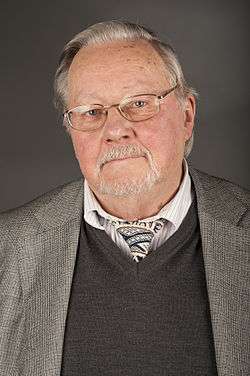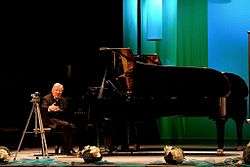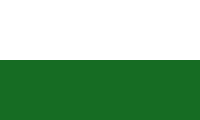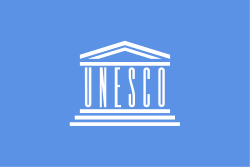Vytautas Landsbergis
| Vytautas Landsbergis | |
|---|---|
 | |
| Chairman of the Supreme Council of Lithuania (de jure Head of State) | |
|
In office 11 March 1990 – 25 November 1992 | |
| Preceded by | Post created |
| Succeeded by | Algirdas Brazauskas (as the Speaker of the Seimas and acting President of Lithuania) |
| Speaker of the Seimas | |
|
In office 25 November 1996 – 19 October 2000 | |
| Preceded by | Česlovas Juršėnas |
| Succeeded by | Artūras Paulauskas |
| Chairman of the Homeland Union | |
|
In office 1 May 1993 – 24 May 2003 | |
| Preceded by | Post created |
| Succeeded by | Andrius Kubilius |
| Member of the European Parliament for Lithuania | |
|
In office 2004–2014 | |
| Personal details | |
| Born |
18 October 1932 Kaunas, Lithuania |
| Political party | Homeland Union |
| Spouse(s) | Gražina Ručytė-Landsbergienė |
| Religion | Lutheran[1] |
| Signature |
 |
Professor Vytautas Landsbergis [ˈvʲîːt̪ɐʊt̪ɐs̪ ˈɫɐ̂ˑn̪ʲd͡zʲbʲɛrʲɡʲɪs̪] (born 18 October 1932) is a Lithuanian conservative politician and Member of the European Parliament. He was the first head of state of Lithuania after its independence declaration from the Soviet Union, and served as the Head of the Lithuanian Parliament Seimas. Professor Landsbergis is an intellectual who has been active in Lithuania's political arena for more than two decades, and is a notable politician who helped contribute to the demise of the Soviet Union. He has written twenty books on a variety of topics, including a biography of Mikalojus Konstantinas Čiurlionis, as well as works on politics and music. He is a founding signatory of the Prague Declaration on European Conscience and Communism,[2] and a member of the international advisory council of the Victims of Communism Memorial Foundation.[3]
Biography
Vytautas Landsbergis was born in Kaunas, Lithuania. His father was the famous architect Vytautas Landsbergis-Žemkalnis and his mother, ophthalmologist Dr. Ona Jablonskytė-Landsbergienė in 1944 sheltered a Jewish teenager in the family home. For this act she was awarded the title of a Righteous Among the Nations by Israel.[4] In 1952 he placed third in the Lithuanian chess championship, after Ratmir Kholmov and Vladas Mikėnas.[5] In 1955, he graduated from the Lithuanian Conservatory of Music (now Lithuanian Academy of Music and Theatre). In 1969, he wrote his thesis for his PhD degree. In 1978, he became a Professor at the Lithuanian Conservatory. From 1978 to 1990, he was a professor at both the Lithuanian Conservatory and the Vilnius Pedagogical University. In 1994, he wrote a thesis for his doctor habilitus degree.
Family
Landsbergis is married to Gražina Ručytė-Landsbergienė (b. 1930), a well-known Lithuanian pianist and associate Professor of the Lithuanian Academy of Music and Theater. His daughters Jūratė and Birutė are also musicians. His son, Vytautas, is a well-known Lithuanian writer and film director. His grandson is Gabrielius Landsbergis (b. 1982).
Political career
Landsbergis entered politics, in 1988, as one of the founders of Sąjūdis, the Lithuanian pro-independence political movement. After Sąjūdis' victory in the 1990 elections, he became the Chairman of the Supreme Council of Lithuania.
On 11 March 1990, he headed the Parliamentary session during which the restoration of Lithuanian independence from the Soviet Union was declared. Lithuania became the first Soviet Republic to do so. According to the temporary Constitution of Lithuania, Landsbergis had constitutional authority over both the Leader of the State and the Speaker of the Parliament. He held this post from March 1990 until the next elections in November 1992.
The Soviet Union attempted to stifle this activity by economic blockade in 1990, but it failed, and other Soviet Republics soon followed suit and declared their independence from Moscow, as well. He was also extremely dubious of the view that Mikhail Gorbachev was trying to liberalize the Soviet Union and that Lithuania should not prevent him from doing so. Landsbergis also played a crucial role during the confrontation between the Lithuanian independence movement and soviet armed forces in January 1991. Iceland was the first state that officially recognized the restoration of Lithuanian independence; Landsbergis was somewhat critical of certain Western powers (such as the United States and United Kingdom) for not showing enough support in Lithuania's bid to restore its independence after more than 40 years of Soviet occupation.
In 1993, Landsbergis led much of Sąjūdis into a new political party, the Homeland Union (Tėvynes Sąjunga). It gained a landslide victory in the 1996 parliamentary elections. Landsbergis served as Speaker of the Seimas from 1996 until 2000. He ran, although unsuccessfully, for President in 1997 (coming up the third after receiving 15.9% of the votes). During the runoff, he supported Valdas Adamkus, who had finished second in the first round. V. Adamkus eventually became President.
In 2004, Landsbergis was elected by Lithuanian voters to the European Parliament in Brussels (the total number of MEPs from Lithuania in Brussels is 13), and has been returned at every election since then.
In 2005, Landsbergis became an international patron of the newly formed Henry Jackson Society.[6]
Since 2015 Landsbergis is together with Roswitha Fessler-Ketteler, MEP Heidi Hautala, Aleksi Malmberg and Frank Schwalba-Hoth member of the advisory board of the Caucasian Chamber Orchestra association and its German "Förderverein".[7]
Attempt to ban Communist and Nazi insignia
In January 2005, Vytautas Landsbergis, backed by Member of the European Parliament from Hungary, Jozsef Szajer, urged to ban the Communist symbols in the European Union, in addition to Nazi symbols.[8] He also sent a letter to Mr. Franco Frattini, the European Commissioner of Justice and Internal Affairs, where he suggested that in case the EU decides to ban Nazi symbols, Communist symbols should be banned too. The Commissioner became interested in this proposal and said: "I am ready to join this discussion. The Communist dictatorships no less than the Nazi ones are responsible for the deaths of tens of millions of people". A bit later, however, the Commissioner decided that he would not attempt to ban any symbols, as there was no agreement in respect to which symbols that should be banned.
Professor Landsbergis' proposal caused quite a stir in Italy where Italian leftists, in the beginning of February 2005, strongly protested against such a move. The Communist Refoundation Party and Party of Italian Communists were outraged at Landsbergis' proposal. The Professor's proposal became the center of the Italian media's attention. One of the most influential Italian dailies, La Repubblica, even published an interview with Professor Vytautas Landsbergis outlining his proposal. It was the first time when the daily allocated a full page for a politician from Lithuania.
Nevertheless, Landsbergis' proposal found few supporters among Italian politicians. However one who did, Alessandra Mussolini, a granddaughter of former Italian fascist dictator Benito Mussolini commented: "To implement the proposal of the Members of the European Parliament regarding Communist symbols is our moral duty".
Landsbergis's proposal was opposed by the Russian Parliament as well. The First Vicespeaker of the Russian State Duma called the proposal "abnormal". Another Russian MP, a communist, commented by saying that "somebody in Europe became insolent and forgot who saved them from the fascists".
However, the debate came to an end when, in the beginning of February 2005, the European Commission rejected calls for a proposed Europe-wide ban on Nazi symbols to be extended to cover Communist Party symbols as well. EU Justice Commissioner Franco Frattini said it would not be appropriate to include the red star and the hammer and sickle in a draft EU law on racism.
Finally, at the end of February 2005, the European Union dropped proposals to ban Nazi symbols across its 25 member states. Luxembourg withdrew the plan when it became clear that members could not reach a consensus on which symbols to ban. There were also concerns that the proposed ban was a threat to freedom of expression.
Professor Landsbergis is a fierce critic of Russia's intentions to impose any kind of influence on the Baltic States and publicly questions Russia's actions vis-à-vis the Baltic States on both local and international media, as well as in the European Parliament. He warns that Russia might have intentions to control Lithuania and the other Baltic States economically and politically through a wide network of former KGB agents and other clandestine activities. Vytautas Landsbergis is one of the most active politicians, who urge Russia to compensate Lithuania and other post-Soviet republics for damage done to them during their occupations.

Bibliography
- Visas Čiurlionis, 2008.
- Karaliaučius ir Lietuva : nuostatos ir idėjos, 2003.
- Pusbrolis Motiejus : knyga apie Stasį Lozoraitį iš jo laiškų ir pasisakymų, 2002.
- Sunki laisvė : 1991 m. ruduo – 1992 m. ruduo, 2000.
- Landsbergis aria, 1997.
- Lūžis prie Baltijos : politinė autobiografija, 1997.
- Čiurlionio muzika, 1996.
- Tėvynės valanda, 1993.
- Atgavę viltį : pertvarkos tekstų knygelė, 1990.
- Sonatos ir fugos / M.K. Čiurlionis [editor], 1980.
- Čiurlionio dailė, 1976.
Honours and awards
Honours
National honours
-
 Lithuania: Former Grand Master Grand Cross with Collar of the Order of Vytautas the Great[9][10][11]
Lithuania: Former Grand Master Grand Cross with Collar of the Order of Vytautas the Great[9][10][11] -
 Lithuania: Former Grand Master Grand Cross of the Order of the Cross of Vytis[12]
Lithuania: Former Grand Master Grand Cross of the Order of the Cross of Vytis[12] -
 Lithuania: Former Grand Master Grand Cross of the Order of Grand Duke Gediminas[9]
Lithuania: Former Grand Master Grand Cross of the Order of Grand Duke Gediminas[9]
Foreign honours
-
 Estonia: Grand Cross with Collar of the Order of the Cross of Terra Mariana[9]
Estonia: Grand Cross with Collar of the Order of the Cross of Terra Mariana[9] -
 France: Grand Officer of the Order of the Legion of Honour[9]
France: Grand Officer of the Order of the Legion of Honour[9] -
 France: Grand Cross of the Order of La Pléiade[9]
France: Grand Cross of the Order of La Pléiade[9] -
 Germany
Germany
-
 Saxony: Recipient of the Saxon Constitutional Medal[9]
Saxony: Recipient of the Saxon Constitutional Medal[9]
-
-
 Greece: Grand Cross of the Grand Cross of Order of Honour[9]
Greece: Grand Cross of the Grand Cross of Order of Honour[9] -
 Latvia: Grand Officer of the Order of the Three Stars[9]
Latvia: Grand Officer of the Order of the Three Stars[9] -
 Luxembourg: Recipient of the European Medal of Merit[9]
Luxembourg: Recipient of the European Medal of Merit[9] -
 Malta: Honorary Knight Grand Cross of Obedience of the Sovereign Military Order of Malta[9][13]
Malta: Honorary Knight Grand Cross of Obedience of the Sovereign Military Order of Malta[9][13] -
 Norway: Knight Grand Cross of the Royal Norwegian Order of Merit[9]
Norway: Knight Grand Cross of the Royal Norwegian Order of Merit[9] -
 Poland: Grand Cross of the Order of Merit of the Republic of Poland[9]
Poland: Grand Cross of the Order of Merit of the Republic of Poland[9] -
 Romanian Royal Family: Extra Knight Grand Cross of the Order of the Crown[14]
Romanian Royal Family: Extra Knight Grand Cross of the Order of the Crown[14]
Awards
- Foreign Awards
- European People's Party: Recipient of the Robert Schuman Medal[9]
-
 France: Foundation du Futur Award[9][15]
France: Foundation du Futur Award[9][15] -
 Germany Hermann Ehlers Prize[9][15]
Germany Hermann Ehlers Prize[9][15] -
 Italy: Vibo Valentia Testimony Prize[9]
Italy: Vibo Valentia Testimony Prize[9] -
 Norway: Norwegian People's Peace Prize[9][15]
Norway: Norwegian People's Peace Prize[9][15] -
 Philippines: Gusi Peace Prize
Philippines: Gusi Peace Prize -
 Spain: Ramon Llull International Prize[9]
Spain: Ramon Llull International Prize[9] -
 UNESCO: Recipient of the Medal for Contribution in Democracy and the Fight for Human Rights[9]
UNESCO: Recipient of the Medal for Contribution in Democracy and the Fight for Human Rights[9] -
 United States: Recipient of the Presidents Truman-Reagan Medal of Freedom of the Victims of Communism Memorial Foundation[9][16]
United States: Recipient of the Presidents Truman-Reagan Medal of Freedom of the Victims of Communism Memorial Foundation[9][16] -
 United Kingdom: International Freedom Foundation Award[9]
United Kingdom: International Freedom Foundation Award[9]
Honorary doctorates
Landsbergis has received honorary doctorates from the following institutions:
- Loyola University, Chicago, 1991
- Vytautas Magnus University, Kaunas, Lithuania, 1992
- Weber State University, Ogden, Utah, 1992
- Yale University, New Haven, Connecticut, 1992
- Vilnius Gediminas Technical University, Lithuania, 1998
- University of Law, Lithuania, 2000
- Helsinki University, Finland, 2000
- Cardiff University, Wales, 2000
- Sorbonne, France, 2001
- Art Academy, Lithuania, 2003
See also
Footnotes
- ↑ Michael Bordeaux, The Politics of Religion in Russia and the New States of Eurasia, (Armonk, NY: M. E. Sharpe, 1995), 212
- ↑ "Prague Declaration – Declaration Text". 3 June 2008. Retrieved 28 January 2010.
- ↑ "International Advisory Council". Victims of Communism Memorial Foundation. Archived from the original on 20 May 2011. Retrieved 2011-05-20.
- ↑ Encyclopedia of the Righteous Among the Nations, Rescuers of Jews during the Holocaust – Europe (Part II), pp. 210–211 (2011)
- ↑ Uogelė, Anicetas (1999). Mano šachmatai (in Lithuanian).
- ↑ "International Patrons of The Henry Jackson Society". Henry Jackson Society. Archived from the original on 30 April 2006.
- ↑ http://www.caucasianco.com/12.html
- ↑
- 1 2 3 4 5 6 7 8 9 10 11 12 13 14 15 16 17 18 19 20 21 , List of Honours and Awards of Vytautas Landsbergis
- ↑ Lithuanian Presidency Archived 19 April 2014 at the Wayback Machine., Lithuanian Orders searching form
- ↑ http://grybauskaite1.lrp.lt/images/27264/27264_2012-10-21_landsbergis_img_7619.jpg
- ↑ http://grybauskaite1.lrp.lt/en/press_center/photographs/21-10-2012.html?backlink=%252Fen%252Fsearch%252Fresults%252Fp0.html
- ↑ http://maltieciai.lt/h-e-president-valdas-adamkus-was-granted-a-name-of-honorary-member-of-mopt/
- ↑ http://www.romaniaregala.ro/jurnal/vytautas-landsbergis-vizita-la-castelul-peles/
- 1 2 3 , Some of the Awards of Vytautas Landsbergis
- ↑ http://victimsofcommunism.org/initiative/truman-reagan/
External links
| Wikimedia Commons has media related to Vytautas Landsbergis. |
- Europarliament member's info page (Prof. Vytautas Landsbergis)
- Vytautas Landsbergis NATO.
- Vytautas Landsbergis biography
- Appearances on C-SPAN
- Interviewed on ANN TV 2015 on the erosion of nation state sovereignty; Western responsibility for protecting the Baltic States; and the state of World democracy
- Vytautas Landsbergis Freedom Collection interview